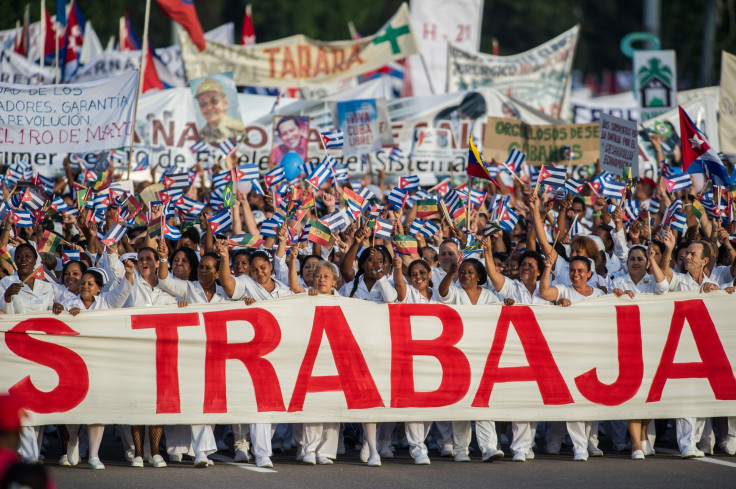Carnival Corp Reverses Decision To Screen Cuban-American Customers, But Will Havana Allow These Tourists To Arrive On May Day?

More than a million people will gather in Havana’s Plaza de la Revolución to celebrate International Workers’ Day May 1, a major socialist world holiday that originally commemorated Americans’ bloody fight for more leisure time and less work time. And the world’s largest cruise ship operator is scheduled to deliver on May Day this year a shipload of camera-wielding U.S. tourists to the shores of the Communist-run Cuba 90 miles south of Miami.
But Carnival said it would undertake this maiden voyage between the two countries only in the event the Cuban government relents on its ban of Cuban-Americans on the cruise, buckling to intense pressure after it initially screened out such customers on its online booking site.
“The company is continuing discussions with Cuba to allow cruise ships to operate in the same manner as current air charter operations, which transport Cuba-born individuals to and from Cuba,” Carnival said Monday. The firm is currently accepting bookings by all travelers “regardless of their country or origin.”
The announcement came after a turbulent week for the cruise ship operator based in Doral, Florida. Carnival experienced an immediate backlash after people learned its reservation system was informing Cuban-Americans they aren’t eligible to take the cruise because of a long-standing prohibition on seaborne arrivals in Cuba by Cuban-Americans.
Amid this backlash, a class-action lawsuit has been filed, led in part by Francisco Marty, a longtime Carnival customer and Cuban-born American citizen. The suit has alleged the company has violated U.S. civil rights laws by discriminating against Cuban-born people.
In arranging the cruise, Carnival was betting on the warming of relations between the U.S. and Cuba that began in December 2014 when U.S. President Barack Obama and Cuban President Raúl Castro announced the start of a normalization process by the former Cold War foes.
Carnival announced last year the creation of an “impact travel” passenger line with one vessel called Fathom that will send American tourists to three Cuban port cities — Cienfuegos and Santiago de Cuba, as well as Havana — with packages costing between $1,800 and $9,000. The company billed it as a way for tourists to interact with local communities, as it specifically avoided calling it a “cruise.”
“The line needs to communicate the idea of a kind-of cruise with activities that revolve more around pouring concrete floors, planting trees and teaching English than snorkeling, shopping and sipping rum runners,” the travel industry news site Skift said in January. “They must identify customers who would value that experience enough to pay a starting price of $974 per person, significantly more than a traditional weeklong Caribbean cruise.”
While the 56-year-old U.S. embargo on Cuba requires congressional authority to be lifted, Obama is making some moves under his executive authority to lighten restrictions on U.S. citizen travel to Cuba and allowing limited trade relations that require Cuba to lift its own restrictions, including the ban on Cuban-American arrivals by sea.
Now the ball is in Havana’s court to decide whether Carnival’s customers will mingle with the Cuban proletariat in Havana on May Day, the first day of the scheduled 8-day kind-of cruise.
© Copyright IBTimes 2025. All rights reserved.






















